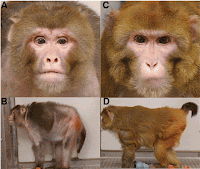Caloric restriction without malnutrition–heard of it? Caloric restriction with optimal nutrition (CRON) or the Longevity Diet–these are all terms for the practice of reducing calories over the long-haul, and some studies have shown it to be beneficial in terms of aging and longevity. The practice has been shown to improve age-related health and to slow the aging process in a wide range of animals and some fungi. Pretty cool, huh?
While still inconclusive as to whether long-term caloric restriction can do the same for humans, results so far have been promising. Take a recent study, for example, that has shown caloric restriction improved heart function in obese people with type 2 diabetes. The study analyzed the heart function and pericardial fat (too much can harm the heart) of fifteen obese people with type 2 diabetes before and four months after they started consuming a 500-calorie-per-day diet.
 |
| Age matched monkey (right) on caloric restriction |
Four months after the participants began the low-calorie diet, average BMI fell from 35.3 to 27.5 (statistical obesity begins at a BMI of 30), and pericardial fat decreased from 39 milliliters (ml) to 31 ml. And diastolic heart function also improved, which is a key measure in preventing congestive heart failure (CHF).
“Our results show that 16 weeks of caloric restriction improved heart function in these patients. More importantly, despite regain of weight, these beneficial cardiovascular effects were persistent over the long term.”
 Interesting results these latest findings. Although I advocate no particular diet for people trying to lose weight other than eating whole, natural foods at moderate portions, I am a big proponent of caloric restriction as a lifestyle habit. Let me explain. I think that in the western world, as a rule, we all eat more than we really need to. Restaurant portions are generally huge, and all you can eat buffets are way too popular (at least in the U.S.). In fact, during a recent trip to Las Vegas, it was not lost on me that the longest line I saw for any event over a three day period was to the all-you-can-eat-buffet.
Interesting results these latest findings. Although I advocate no particular diet for people trying to lose weight other than eating whole, natural foods at moderate portions, I am a big proponent of caloric restriction as a lifestyle habit. Let me explain. I think that in the western world, as a rule, we all eat more than we really need to. Restaurant portions are generally huge, and all you can eat buffets are way too popular (at least in the U.S.). In fact, during a recent trip to Las Vegas, it was not lost on me that the longest line I saw for any event over a three day period was to the all-you-can-eat-buffet.












